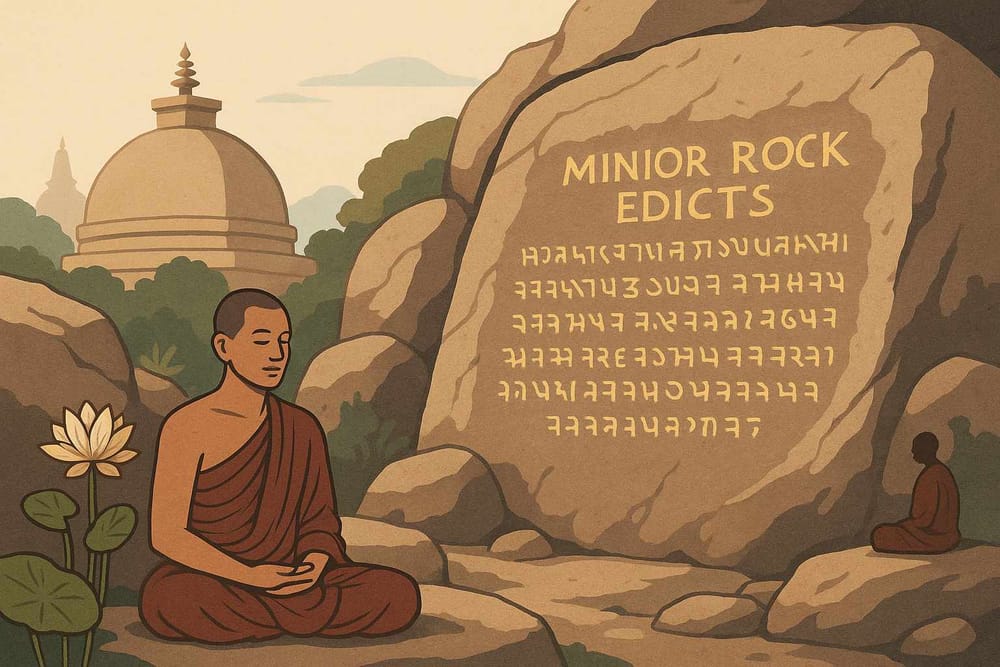
Minor Rock Edicts in Ancient History- Their True Significance
Imagine journeying through the serene landscapes of India, perhaps in Karnataka or Madhya Pradesh, and coming across an ancient boulder. It looks ordinary at first, but as you get closer, you see faint carvings—a script you don't recognise, yet you can feel its immense age. This isn't just a rock; it's a messenger from over two millennia ago, carrying the personal story of a king who traded his sword for a life of peace. This is the world of Emperor Ashoka’s Minor Rock Edicts, some of the most personal and profound inscriptions in our history.
A King's Change of Heart: The Story Behind the Stones
Every story has a turning point, and for Emperor Ashoka, it was the brutal Kalinga War. The immense loss of life shook him to his core, leading to a profound spiritual awakening. Embracing the path of Buddha, his entire approach to governance transformed. This change of heart wasn't a secret kept within the palace walls; Ashoka wanted to share his newfound wisdom with every single person in his empire. And so, he began his mission to inscribe his thoughts on stone.
These Minor Rock Edicts are incredibly special because they represent his very first attempt to communicate his message of Dhamma (moral law). Dating back to the 3rd century BCE, they are the earliest of his edicts, even older than the more famous Major Rock Edicts. They reveal a man grappling with his past and passionately advocating for a future built on compassion, non-violence, and ethical living.
More Than Royal Decrees: What Makes These Edicts So Unique?
Unlike the Major Rock Edicts, which often deal with administration and grander policies, these smaller inscriptions feel like a personal conversation. They were carved in places where ordinary people lived and travelled, a clear sign that Ashoka wanted his message to reach the common folk, not just officials. Written in the local Prakrit language using the simple Brahmi script, they were meant to be understood by all.
One of the most exciting discoveries was the edict at Maski in Karnataka. For years, historians knew of a great king called "Devanampriya" (Beloved of the Gods), but it was this inscription that finally confirmed that Devanampriya was none other than Ashoka himself. It was like finding a signature on a timeless masterpiece.
The significance of these edicts goes deep, touching upon several key aspects of our history:
- A Glimpse into Ashoka’s Personal Faith: These inscriptions are not just about state policy. They show Ashoka as a humble lay disciple (Upasaka) of the Buddha, sharing his personal spiritual journey and his closeness to the Buddhist order (Samgha). It’s a rare and intimate look at the faith of one of India's greatest rulers.
- The Foundation of Dhamma: The core of Ashoka's message was Dhamma, a code of conduct based on morality and ethics. These small edicts were the seeds from which his grander vision of a righteous society grew. They remind us that the greatest changes often begin with small, heartfelt steps. The principles of Dhamma echo through ages, much like the wisdom found in our Hindu epics that guide modern living.
- A Message for Everyone, Everywhere: Finding these edicts in remote corners of the country proves Ashoka’s incredible desire for inclusivity. He wanted his message of peace and respect to resonate in every village and forest, ensuring that no one was left out of his vision for a compassionate kingdom. This reminds us of the power of visiting sacred sites that echo with history and spirituality.
Timeless Wisdom Carved in Stone for Today's World
You might be wondering, what exactly can these ancient messages teach us today? These are not just historical artifacts; they are powerful reminders of a leader’s commitment to building a better world. When you read about Ashoka’s emphasis on respecting elders, being kind to all living beings, and practicing tolerance, you realise these values are more important now than ever before.
These edicts show us that true strength lies not in conquest, but in compassion. They are a testament to Ashoka's profound transformation and his dedication to spreading righteousness. His legacy is not in the empire he ruled, but in the values he championed. In our own lives, these ancient whispers encourage us to choose understanding over conflict, harmony over division, and to lead with a sense of responsibility towards one another.
Preserving Our Sacred Heritage at Bhaktilipi
At Bhaktilipi, we believe that stories like Ashoka's and the wisdom contained in these ancient edicts are the soul of our heritage. Our mission is to preserve these timeless narratives and make them accessible to everyone. We carefully collect and digitise devotional literature and historical texts so that the wisdom of our ancestors can inspire generations to come.
Just as Ashoka used stone to share his message, we use technology to share the rich tapestry of Indian devotional stories and cultural insights. If you feel a connection to our shared past and want to explore it further, we invite you to join our community.
Stay connected with us for more such inspiring content. You can subscribe to our YouTube channel for beautiful videos, follow us on Instagram for daily inspiration, and join the conversation on our Facebook page.
Sign up for our newsletter to receive curated devotional stories, historical insights, and much more directly in your inbox!
A passionate group of people dedicated to preserving India's knowledge of Dharma, Karma, and Bhakti for ourselves and the world 🙏.
Comments
Related in

Minor Rock Edicts: Ancient Inscriptions Reveal Significance
Imagine wandering through the rugged landscapes of India, and your eyes fall upon a rock. Not just any rock, but one that has been carrying a message for over two thousand years. A message carved not for kings or scholars, but for everyday people like you and me. This isn&
